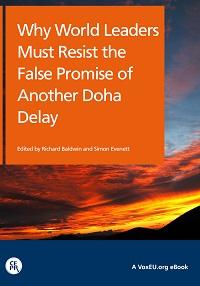The Doha Round of multilateral trade negations has come to a critical point. Last week the WTO released – for the first time in 10 years of talks – the Doha package in its entirety. These documents illustrate the enormous progress that has been made, but they also clearly outline the deadlock holding up progress.
The deadlock hinges on the US and China with many fellow travellers. US President Obama thinks he cannot win the domestic political battle against US protectionists that would be necessary to ratify a Doha agreement without fulsome support of US export interests. Such support, he believes, would require much larger tariff cuts by emerging economies – especially China, India, and Brazil. These nations believe that they cannot offer greater cuts, so Doha is deadlocked.
In meetings starting this today, WTO members must now decide what to do next. This is the proverbial fork in history’s road: a choice must be made. The essays in VoxEU’s latest eBook – written by leading thinkers on trade from around the world (on 3 days notice)1 – show that President Obama and the leaders of China, India, and Brazil must choose one of two paths:
- The politically expedient path of putting Doha on hold, or
- The leadership path of engaging constructively and creatively to break the deadlock in 2011.
Other world leaders’ views will be critical down the road, but which road history takes will be determined by the choices of the US, China, India, and Brazil.
If not in 2011, then not before 2020
Many believe the Round can be put on hold until 2013 (after the US elections and the Chinese change of senior leadership). This is a false promise based on wishful thinking – the options are now, or not before the end of the decade.
US Congressional politics will be much rougher from 2013 – scared by divisive debates driven by extreme positions taken on the role of government. In this poisonous climate, the US President will find it harder to compromise on multilateral trade liberalisation than in 2011. Likewise, the new Chinese leadership can hardly start their stewardship of China-US ties with major unilateral tariff concessions.
Think of 2013 as 2011 with less goodwill internationally, more poisonous politics inside the US, and a Chinese leadership that must prove its toughness.
The only way to break the deadlock starting in 2013 would be to give China and India something new for which to bargain. The big concession the US is offering in Doha is on agriculture. This interests Brazil, but China and India need other inducements. Chinese and Indian export interests need to be offered prizes that will make them willing to push their governments into signing.
The predicament is that adding such prizes would require new negotiations on an expanded Doha agenda. History tells us that it takes years to negotiate a new agenda, and then years to complete the actual bargaining.
This is why 2011 is a fork in history’s road. If the US and China are unwilling to break the deadlock in 2011, no deal is likely before 2020. Opting for a brief pause would be camouflage for abandoning multilateral liberalisation for the foreseeable future.
The dangers of delaying Doha
Delaying Doha would be foolhardy. The authors of the eBook argue that failure to conclude the round this year would damage the multilateral system in an era when multilateral cooperation is in short supply.
- The multilateral trading system is the economic sinew that constrains the exercise of international political muscle in ways that damage global well-being and inflicts national self-harm.
- With the rise of China, a US that is turning inward, turmoil in the Middle East, and a damaged and imbalanced global economy, the world needs such sinews now more than ever.
Like global warming, the erosion of WTO centricity won’t be an event, it will be a process. And like global warming, the costs will come in unexpected spurts and in unexpected ways.
The essays argue that the dangers of choosing the false promise of a Doha delay include:
- An undermining of the WTO Dispute Settlement Mechanism;
- An advance of regionalism that fills the vacuum left by the WTO’s inability to make progress, thus further undermining the WTO’s centricity in global trade governance;
- A rise of protectionism that will almost certain be encourage by an erosion of the WTO authority;
- A blow to least developed nations for whom the Doha package would have provided important gains;
- A blow to agricultural exporters who were counting on Doha to rebalance the world’s treatment of industrial and agricultural goods.
What leaders need to do in the coming weeks
In his essay, Ernesto Zedillo, former President of Mexico, argues that direct involvement of heads of state is required. Failure of such engagement would put globalisation, and its enormous benefits, at risk.
But the heart of the deadlock cannot be denied or waved away. Today, as in 2013, and as will be the case for the rest of the decade, the US will demand deep Chinese tariff cuts that China will refuse. As Alberto Trejos puts it, stirring calls for the round’s successful conclusion are simplistic and naïve.
If US and Chinese leaders are to find more room for compromise, they must find ways to loosen their domestic political constraints. This means challenging the premise on which the deadlock is based – namely, the view that Doha is mostly about new market access. The narrow special interests creating the Doha deadlock should not be allowed to jeopardise the world trading system and the benefits Doha would bring to all nations.
- President Obama and the Chinese leadership need to make the case to their own domestic constituencies that Doha matters for reasons far beyond the tariffs on the table.
- They should argue that Doha needs to be done to preserve one of the world’s most precious public good – the rules-based, WTO-centric trade system – a system that has created so much prosperity in America and lifted so many people out of poverty in China, India and Brazil, and more recently in Africa.
In particular, the narrow focus of US export lobbies on additional market access should be challenged by the Obama Administration. These farmers, industrialists and service providers are some of the biggest users of the public good that is the WTO-centric trading system. They should understand that doing Doha – even if it appears to them as insufficient in the short run – is in their enlightened self-interest.
- World leaders should also consider compensatory arrangements that could make Doha reforms more palatable to the special interest groups behind the deadlock, especially China.
- The Obama Administration and Chinese leadership should “sell” completion of the Doha Round to their own domestic audiences on national security grounds.
A flourishing and forward moving multilateral system as for 60 years proved to be one of the cheapest and surest ways of fostering world peace and security. Both the old super-power and the rising super-power should view doing Doha as a good, practical, and above all immediately available, step towards the sort of mutually beneficial, mutually respectful relationship that they must develop if internal and external harmony is to be maintained.
- Above all, world leaders should not give up on Doha by letting it drag on beyond 2011.
As the Interim Report (2010) presented at Davos in January 2011 showed, the world is tantalisingly close to a successful conclusion of the round. What we need is a bit more compromise from the world’s largest beneficiaries of the global trade system.
The eBook’s message is best summarised by the man who guided the last multilateral round to success. In his essay in the eBook, Peter Sutherland writes:
Free trade has never been an easy sell but the eight trade rounds that have taken place to date have helped to define the world in which we live.
- They have provided a bulwark against the protectionism that lurks in most societies and that is evident in some of the new nationalism emerging in Europe and elsewhere.
- They have provided growth and stability and have avoided the destructive trade conflicts of the past that have caused such terrible divisions.
Political leaders must now commit resources and time to concluding the round or they will bear the responsibility for serious damage being caused not merely to globalisation but to the process of multilateralism more generally.
References
Baldwin, Richard and Simon Evenett, eds (2011), Why world leaders must resist the false promise of another Doha delay, a VoxEU.org eBook, April 28
Interim Report (2011). “The Doha Round: setting a deadline, defining a final deal”, Interim Report of the High Level Trade Experts Group. See Davos video here.
1 The authors of the eBook are: Richard Baldwin, Claude Barfield, Chatib Basri, Peter Drysdale, Simon Evenett, Anne Kreuger, Phil Levy, Patrick Messerlin, Andre Nassar, Carlos Perez, Peter Sutherland, Subidey Togan, Alberto Trejos, Qian Wang, Ernesto Zedillo, and Lei Zhang



